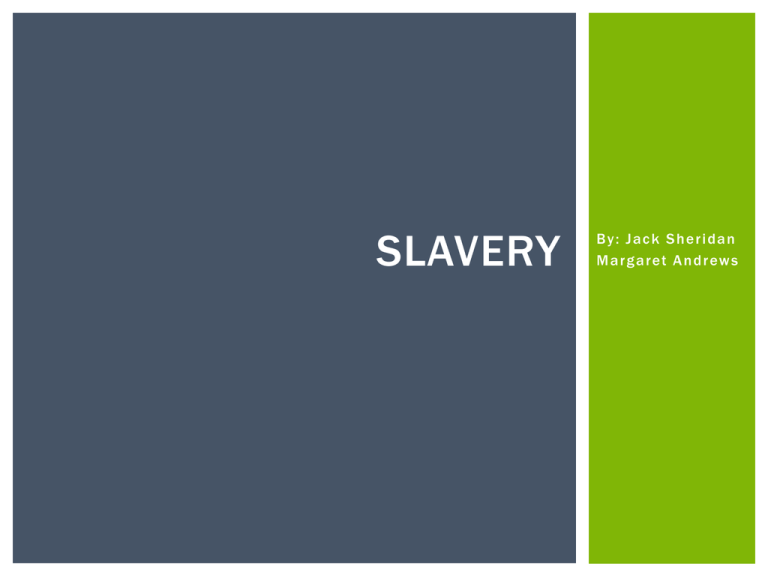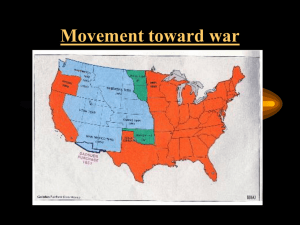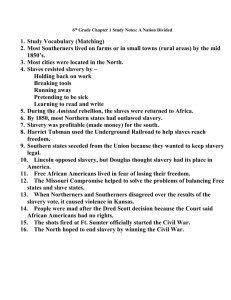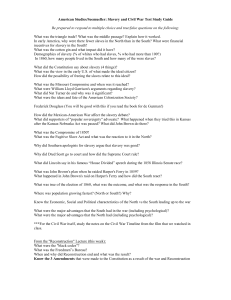Slavery - EHS-APUSH2011-2012
advertisement

SLAVERY By: Jack Sheridan M a r g a r et A n d r ew s THE NORMS OF SLAVERY The practice of slavery is accepted in the United States. Vast land selection promotes slavery. Because of the Enlightenment after the Revolution, there is a small percentage of people that question the morality of slavery. (Howe, 152) CONCENTRATION OF SLAVERY IN THE UNITED STATES IN 1830 http://mapserver.lib.virginia.edu/index.html TREATMENT OF SLAVES IN DIFFERENT REGIONS Tre a te d a s pro pe r t y. So l d a t a uc t i o ns s i milar to c a t t l e . Fa m ilies a n d ( t ri be member, fri e n ds et c . ) purpo s e l y s e pa ra ted. H a d n o c i v il ri g h t s exc e p t prote c t i o n fro m m urde r. So m e s t a te s pa s s ed s pe c i fic l aw s o n s e pa ra t ion o f fa m ilies a n d s e lling o f c h i ldre n o f c e r t a i n a g e s, but t h ey we re di f fi c ul t to e n fo rc e. Fl o g gings a n d w h i ppi ngs we re c o m m on E duc a t i o n wa s n ot ava ilable, a l l owed, o r e n c o ura ged. 9 / 10 s l aves t h a t fo ug h t i n t h e Ci v il Wa r we re i l lite rate . Sl ave s m ug gler s we re o f te n n ot pun i s hed i n t h e So ut h . ( Kennedy, M., Lizabeth Cohen, and Thomas A. Bailey, 357-360) http://www.blackvibes.com/images/bvc/46/8998slave-whipping-scars.jpg OPINIONS OF SLAVERY IN DIFFERENT REGIONS The South still relied heavily on slavery for their economy, especially with the cotton gin and short – staple cotton. The North was using industrial advances that did not require slaves. Reform movements were growing in the North due to the Enlightenment. Slavery was heavily concentrated in Virginia, South Carolina, and in the Cottony Kingdom. 75% of the population in the ‘Black Belt’ was slaves. ( Kennedy, M., Lizabeth Cohen, and Thomas A. Bailey, 357-360) ECONOMIC BENEFITS OF SLAVERY S m u g g li n g w a s n ’ t a c k n o w l e d g e d i n m o s t S o u t h e r n g o v e r nm e n t s . “ W h i te s w o r r ie d t h a t g e n e r a l e m a n c i p a t i on w o u l d j e o p a r d i z e w h i te s u p r em a c y a n d t h r e a te n i n s u r r e c t i o n , a n d ev e n w h e r e t h e b l a c k p o p ul a t io n w a s s m a l l , w h i te s w o r r ie d t h a t f r e e people might become public charges. N o w h e r e w e r e w h i te s w i l li n g to b e t a x e d to p ay c o m p e n s a t i o n to o w n e r s f o r f r e e i n g t h e i r s l av e s . ” ( H o w e , 5 3 ) “ T h e key f a c to r i n ex p l a i ni n g b o t h t h e “A t l a n t i c s l av e t r a d e a n d t h e p e r p et ua t io n o f s l av e r y o n t h e U n i te d S t a te s w a s p r o f i t a b il it y. ” ( H o w e , 5 3 ) E m e r g e n c e o f s h o r t – s t a p l e c o t to n a f te r 1 81 5 c a u s e d m o r e d i f fi c ult y f o r e m a n c i p a t i on . ( P a g e a n t , 5 6 ) S l av e s w e r e a g o o d i nv e s t m e n t , s o p r o fi t a b l e t h a t t h ey c r o w d e d o u t o t h e r i nv e s t m e n t o p t i o n s . http://fiberorganics.com/Images/cotton.jpg SOUTHERN REASONS AGAINST REFORM So ut h k n ew t h a t t h e ba n o f s l aver y wo ul d c ri ppl e t h e i r e c o n omy Pa te rn alism Th e m a s ter s s a i d t h a t t h e i r re l a t ionship w i t h s l aves i s c a ri n g fo r t h o s e w h o c o ul d n ot l o ok a f te r t h e m selves. Sl ave c o n s pirac ies fri g h ten ed a l l s l ave h o l der s. Th ey we re s o a fra i d t h a t e m a n cipa t ions wo ul d s um mon a re be l lion t h a t s l ave ow n e r s wo ul d n ot g ra n t e m a nc ipat ion fo r “ fi n a nc ial c o m pe nsa tio n” Co n te nde d t h a t s t a te s h a d t h e ri g h t to j udg e l e g ality o f s l aver y Th e So ut h h a d s l ave c o de s t h a t fo rc e d t h e n o r t h to l e gally ret urn a ny run away ow n e r s to t h e i r ow n e r s http://www.sonofthesouth.net/slavery/photographs/slaves.jpg i n t h e So ut h . (Howe, 59-60) NORTH BEGINS REFORM American Colonization Society founded in 1817 helped to found the Republic of Liberia in 1822. The Second Great Awakening helped to energize people to question if slavery is morally correct. Theodore Dwight Weld held an eighteen day debate over slavery at the Lane Theological Seminary in 1833. His writings influenced Harriet Beecher Stowe’s Uncle Tom’s Cabin that was published in 1852. William Lloyd Garrison started his militantly antislavery newspaper, The Liberator, in 1831 . Founded the American Anti Slavery Society in 1833. Frederick Douglass was famous for his speeches and text, Narrative of the Life of Frederick Douglass. Sojourner Truth (Isabella) gave powerful speeches and dictated an autobiography. (Howe, 52) ( Kennedy, M., Lizabeth Cohen, and Thomas A. Bailey, 357-360) LAWS THAT PROMOTE EMANCIPATION New York recognizes the legality of slave marriages in 1 809 which makes it illegal to separate the couple from their children. New York adopted a program of emancipation that slaves born af ter 1799 would be freed at age 28 for males and 25 for females and in 1 817 they declare that all slaves would be freed in 1 827. The Continental Congress prohibited slaver y in the Nor thwest Territor y in 1787. Slave Trade Act of 1794 prohibited the making, loading, outfitting, equipping, or dispatching of any ship is to be used in the slave trade. Slave trade is outlawed by Congress in 1 808. 1780 Delaware prohibits impor tation of African Slaves. 1780 Pennsylvania begins an emancipation process. 1778 Virginia prohibits the impor tation of slaves. In 1 809 Congress declared that anyone found impor ting slaves would be given the death penalty. (Howe, 52-53) (Draper, Sharon) INCREASED SECTIONALISM Economic and ideological dif ferences create a rift between North and South. This division was enhanced by cultural (race, religion) and economic (industrial vs. agricultural) dif ferences between the two regions. BIBLIOGRAPHY Draper, Sharon. "TIMELINE OF SLAVERY IN AMERICA 1501 -1865." Web. 7 Nov. 2011 . <http:// sharondraper.com/timeline.pdf >. Howe, Daniel Walker. What Hath God Wrought: the Transformation of America, 1815-1848. New York: Oxford UP, 2007. Print. Kennedy, M., Lizabeth Cohen, and Thomas A . Bailey. The American Pageant. 1 2th ed. Boston, MA: Houghton Mif flin, 2006. Print. Univer sity of Virginia Librar y . University of Virginia, Geospatial and Statistical Data Center, 2004. Web. 08 Nov. 2011 . <http://mapser ver.lib.virginia.edu /index.html>. Wahl, Jenny. "Slaver y in the United States". EH.Net Encyclopedia, edited by Rober t Whaples. March 26, 2008. URL http://eh.net/encyclopedia/article/ wahl.slaver y.us Web. 7 Nov. 2011 . <http:// fiberorganics.com /Images/cotton.jpg>. Web. 7 Nov. 2011 . <http://www.blackvibes.com /images/bvc/46/8998-slave-whippingscars.jpg>. Web. 7 Nov. 2011 .




